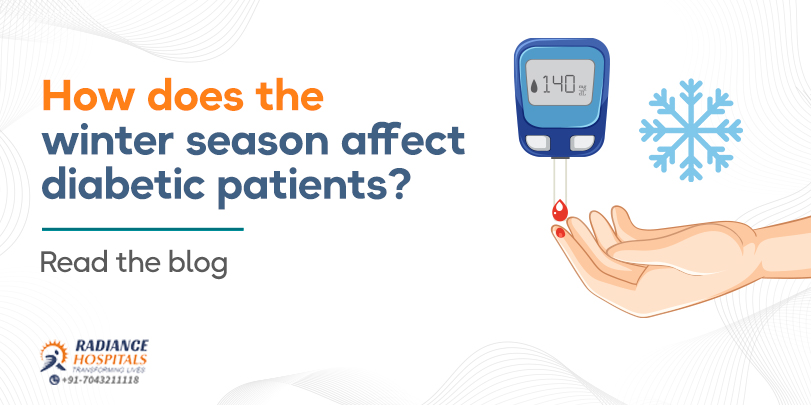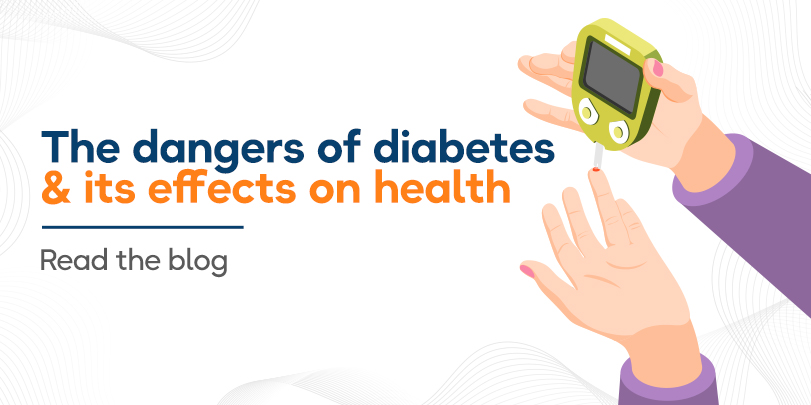With the onset of winter, a lot of health problems tend to arise. As the temperature drops, atmospheric pressure goes down and bodies start going to “energy saving mode” as a primal survival instinct, everyone’s health is adversely affected. However, people with severe and chronic medical conditions, such as diabetes, should be on higher alert.
Diabetes is an illness that needs to be kept under check for several reasons. One of the biggest reasons is that sugar levels tend to be erratic and even the smallest of changes can lead to significant damage. Diabetes control should become a top priority during colder days. Diabetic people are more likely to have high blood glucose levels in the winter than in the summer. As the temperature decreases and sugar levels rise, diabetes patients should be especially cautious of temperature swings or seasonal changes. The cold weather causes various health difficulties for diabetics, in addition to causing a significant fluctuation in blood sugar for diabetes.
Let’s look more closely at the critical relationship between the winter season and diabetes, and how people with high blood glucose levels may stay healthy in the coming months.
DIABETES AND WINTER
The following are the most dangerous consequences that diabetes people may experience throughout the winter.
-
Change in hemoglobin levels
Diabetes is identified more frequently in the winter months than in the summer months, according to studies, since people with diabetes have higher HbA1c values during this season. The seasonal variation in hemoglobin concentration and red blood cell counts appears to be due to temperature and not relative humidity. This difference is evident in every gender, race, age, and diabetes severity category.
The hemoglobin A1C (HbA1c) test measures the amount of blood sugar attached to your hemoglobin that “is the part of your red blood cells that carries oxygen from your lungs to the rest of your body. It is an important blood test that gives a good indication of how well your diabetes is being controlled.”
This difficulty in obtaining correct blood test results during the winter months can be problematic, as frequent monitoring of blood glucose levels is critical for diabetics. This is especially true for people on insulin or at risk of acquiring dangerously low blood glucose levels. Diabetes control is, therefore, important and should be done with blood sugar control. Doctors will be unable to change his prescriptions to keep his blood glucose levels within the recommended range if the patient does not exercise blood sugar control. Similarly, he will be unable to recognize and control low glucose levels, which can lead to major problems such as loss of consciousness or seizures if left untreated.
-
Increased Stress Levels
The chilly weather puts the body under extra effort, leading it to release stress chemicals like cortisol and adrenaline. These hormones induce your liver to produce more glucose for energy, resulting in an increase in blood sugar levels. Blood sugar control is key and getting frequent blood sugar tests is important.
These stress hormones are also secreted more quickly during illness or infection, which is prevalent throughout this season. When the body is exposed to an illness, stress hormones such as adrenaline and cortisol are released, reducing the efficacy of insulin – the hormone responsible for decreasing glucose levels. This causes elevated glucose levels, which may be difficult to return to normal.
-
Increased Risk of Disease
Our immune system is mostly impacted by lifestyle factors such as poor food habits, a lack of physical activity, a lack of sleep, and a stressful work environment. It is also heavily affected by changes in the weather. This is why your immune system frequently struggles throughout the winter.
When the weather is warm and windy, the body gets languid and lethargic, resulting in a weak immune system. Winter also brings with it a slew of viruses, illnesses, and allergies. It is critical to focus on improving your white blood cell count and preparing more antigens in the body to fight various illnesses, making you stronger, healthier, and more active to enjoy the chilly but cozy weather.
-
Mental Health problems
Physical health is not the only thing that takes a hit when the colder season arrives. With lesser sunlight and lower outdoor activity, winter blues may have a heavy impact on your lifestyle.
People with seasonal depression or seasonal affective disorder fall prey to this but diabetes also plays a major role in affecting mental health during winter. Seasonal Affective Disorder is a kind of depression that is produced by a change in seasons, most notably when autumn arrives. This seasonal depression worsens in the late autumn or early winter before subsiding in the warmer days of spring.
A milder variant, known as “winter blues,” also exists. It’s common to feel sad during the winter months. Due to less sunshine in winter, the brain produces lesser serotonin, a neurotransmitter connected to brain circuits that control mood. When nerve cell connections in the brain that govern mood do not function properly, it can lead to feelings of sadness as well as weariness and weight gain. Diabetes worsens the problem tenfold.
-
Nervous System Problems
Diabetes can cause many neurological diseases which may become worse in the cold. Diabetes control may require additional support. Other issues include:
- Nerve ache
If you have nerve pain, you will notice that the temperature affects your symptoms. This is due to the neurological system’s reaction to temperature variations. If the temperature is too high, you may feel weary and sluggish; if it is too low, you may experience more discomfort.
- Muscle tenseness
If you have multiple sclerosis or suffer from spasticity, cold temperatures can trigger muscular rigidity and spasms.
- Loss of sensation
Most diabetic people are unaware of their nerve functions and are unable to feel the difference between cold and hot water, which can lead to burns. During the winter season, most diabetic patients tend to lose feeling in their toes and feet due to vascular changes
- High blood pressure
If you have high blood pressure or vascular difficulties, you should avoid being out in the cold for lengthy periods of time and make sure your home is warm enough.
HELPFUL TIPS
So, it’s winter outside, there are fewer hours of sunlight, and you’re sick of dealing with diabetes. The cold weather encourages you to move less and consume more. What now?
Here are a few tips to keep the winter blues away!
-
Warm your body up.
Exercise reduces blood sugar, improves insulin utilization, keeps you warm, and can even enhance your mood.
There are several methods to be active without leaving your house. Try yoga, going up and down the stairs, dancing, or cleaning your room. Warm up your muscles, cleanse your mind, and reduce your blood sugar by exercising them.
-
Take good care of yourself
Diabetes is more difficult to manage while you are ill. If you have a cold, virus, or flu and develop ketones, make sure to stick to your sick day restrictions. If ketones persist, consult us at Radiance Hospitals.
-
Keep a good diet
Count your carbs, eat healthier foods, increase your protein and fiber intake and control your sugar and fat intake. Try not to order food from outside. Stews and soups with lots of nutritious veggies can help keep you warm and are often healthy choices. Excessive indulgences linked with the holiday and festive seasons should be avoided.
-
Don’t forget to medicate
Take your medications regularly. Be careful about your insulin doses and timings. Regularly conduct blood sugar tests to know your dosages and meals.
-
Keep your Spirits Up!
It might be more challenging to keep in touch with friends throughout winter. Spending time with people can help you beat the winter blues, even if it requires a bit extra work. Invite a friend. Simply conversing can improve your mood and make you feel less lonely.
Despite your best efforts, the winter blues can set in and leave you feeling gloomy. We all have terrible days, but if you are feeling “blue” for an extended period of time, you should seek professional treatment.
You should also be on the lookout for the following depressive symptoms:
- Being exhausted (more than usual).
- Having difficulty concentrating on chores.
- A shift in eating habits.
- Irritability or moodiness.
- Feeling stressed and/or guilty.
- Craving solitude
- Loss of interest in hobbies or activities that you formerly loved.
-
Regular checkups
You cannot exaggerate how essential regular checkups are in winter. Even on your own, you need to conduct more blood sugar tests and diabetes tests in general. But coming down to our center is highly recommended so we can stay up-to-date.
Maintaining blood sugar control will help you through the harsh winter. Following the ideas above of being active, counting carbohydrates, and remaining connected with people can help keep your body and mind healthy all winter – and throughout the year!
With Radiance Hospitals, you are not braving the winter alone. We will be with you till the end of the line. Make sure you get more checkups and stay updated on your health during these days. Book an appointment with us to stay on top of your health.










